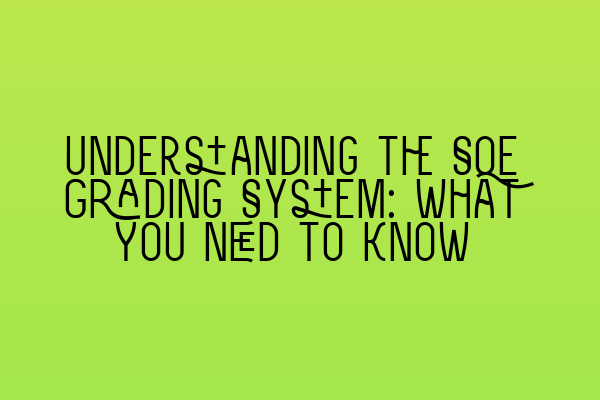Understanding the SQE Grading System: What You Need to Know
As you prepare for the Solicitors Qualifying Examination (SQE), it’s essential to familiarize yourself with the grading system. Understanding how the exam is graded can help you gauge your performance, set realistic expectations, and identify areas for improvement. In this article, we will explore the SQE grading system and provide you with valuable insights to navigate this crucial aspect of your preparation effectively.
Before delving into the details, it’s worth mentioning that the SQE is a two-part examination designed to assess candidates’ competence and readiness to practice as solicitors. The first part, SQE1, focuses on testing your knowledge of substantive legal principles, while the second part, SQE2, evaluates your practical legal skills. Both parts of the exam are equally challenging and require comprehensive preparation.
Now, let’s dive into the grading system for each part of the SQE:
1. SQE1 Grading System:
SQE1 comprises multiple-choice questions (MCQs) and written examination questions. This part of the exam is divided into three functional legal knowledge (FLK) assessments and a legal research exam (LRE). Each assessment is graded separately, and the scores are combined to determine your overall result for SQE1.
The grading scale for SQE1 ranges from “Competent” to “Not Competent.” It’s crucial to note that a minimum competency level is required in each assessment to pass the overall SQE1 exam. To ensure you achieve the desired grade in SQE1, it is essential to study strategically, utilize reliable revision resources, and practice regularly using SQE preparation tools.
To boost your preparation for SQE1, consider reviewing these related articles:
– SQE Mock Debrief Sessions: Analyzing Your Performance for Growth
– Comprehensive SQE Prep Resources: Your Key to Exam Readiness
2. SQE2 Grading System:
Unlike SQE1, which focuses on knowledge-based assessments, SQE2 evaluates practical legal skills. This part of the exam is divided into five skill assessments, namely Legal Research, Writing, Drafting, Advocacy, and Client Interviewing. Each assessment is graded separately, and the scores are combined to determine your overall result for SQE2.
Similar to SQE1, the grading scale for SQE2 ranges from “Competent” to “Not Competent.” It’s important to note that each assessment must be passed at a minimum competency level to achieve an overall passing grade in SQE2. To excel in the practical aspects of the exam, it is essential to enhance your skills through practice, mock debrief sessions, and real-life scenario simulations.
To further enhance your understanding of the SQE2 grading system, consider reading these related articles:
– Top Resources for SQE Preparation: Tools to Help You Succeed
– Tips for SQE Success: Key Pointers for a Stellar Performance
It’s worth mentioning that achieving a passing grade in both SQE1 and SQE2 is necessary to qualify as a solicitor. This makes proper understanding of the grading system and focused preparation vital to your success in the SQE.
In conclusion, familiarizing yourself with the SQE grading system is an inseparable part of your exam preparation journey. By knowing how the exam is graded and what is required to achieve a passing grade, you can develop effective study strategies, identify areas for improvement, and boost your chances of success.
When it comes to SQE preparation, remember that practice, comprehensive study resources, and leveraging practical tools are key. By regularly practicing past papers, participating in mock debrief sessions, and utilizing reliable SQE preparation resources, you can optimize your performance and increase your chances of passing the SQE with flying colors.
Best of luck with your SQE journey!
Disclaimer: This article is for informational purposes only and should not be considered legal advice. Please consult with a qualified solicitor or legal professional for any specific matters related to the SQE and its grading system.

Leave a Reply